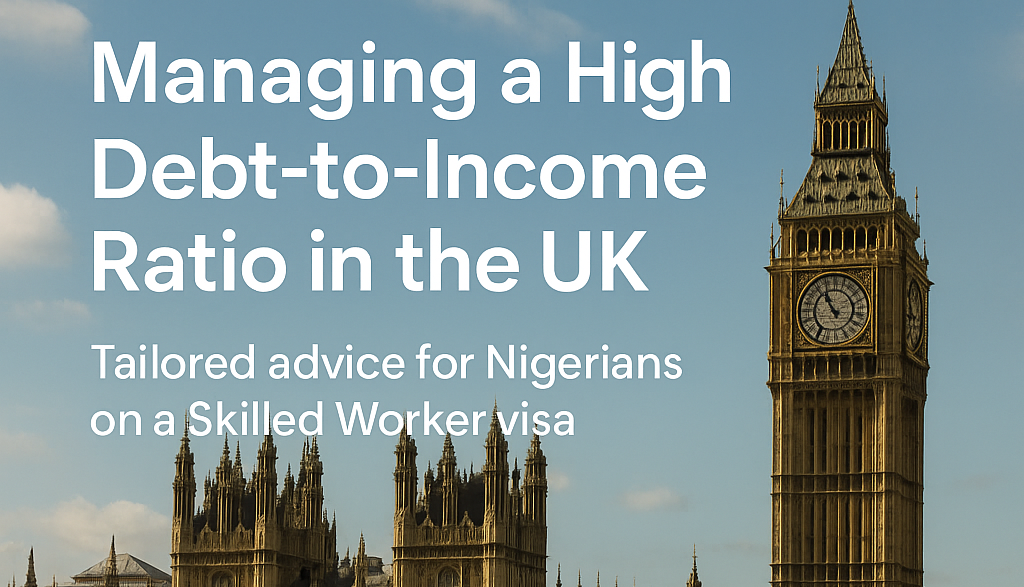Advice for Nigerians on a Skilled Worker visa
Living and working in the UK as a Nigerian can be exciting — but also financially challenging, especially if you’re juggling visa requirements, family responsibilities, and debt repayments. Whether it’s rent, car finance, or credit cards, understanding and managing your Debt-to-Income (DTI) ratio is crucial for your financial stability and even your immigration status.
What is DTI (Debt-to-Income Ratio)?
Your DTI measures how much of your monthly gross income (before tax) goes toward debt payments.
In the UK, lenders often prefer your DTI to be below 40% for credit approvals, mortgages, or renting property.
Here’s how to calculate it:
👉🏽 Add up your monthly debts (loans, credit cards, car payments, etc.).
👉🏽 Divide that total by your gross monthly income.
👉🏽 Multiply by 100 to get a percentage.
Example:
- Rent: £1,200
- Car loan: £250
- Credit cards: £300
- Gross income: £3,500
Total debt: £1,750
DTI = (1,750 ÷ 3,500) × 100 = 50% (too high!)
Why Should Nigerians in the UK Care About DTI?
🔹 Skilled Worker Visa Requirements:
When applying for visa extensions or Indefinite Leave to Remain (ILR), UKVI checks your financial stability. Excessive unpaid debt or CCJs (County Court Judgments) could cause problems.
🔹 Future Plans:
If you dream of buying a house through Help to Buy, Shared Ownership, or even a mortgage, a high DTI will hurt your chances.
🔹 Mental Health:
Debt stress is real. Managing it early can help protect your mental and emotional wellbeing.
Strategies for Reducing Your DTI in the UK 🇬🇧
1. Increase Your Income (Legally)
- Side Hustles Allowed:
As a Skilled Worker visa holder, you’re allowed to do secondary jobs for up to 20 hours per week outside your main job only in shortage occupation fields (e.g., healthcare, IT, engineering).
👉🏽 Examples: Care assistant shifts, freelance tech gigs, tutoring. - Sell Unused Items:
Facebook Marketplace, Vinted, and eBay are great for selling clothes, gadgets, or furniture you no longer need.
2. Cut and Manage Debts Properly
- Focus on High-Interest Debts:
Credit cards can kill your budget fast. Pay off high-interest debts first using methods like the snowball (smallest balance first) or avalanche (highest interest rate first). - Debt Consolidation (UK Style):
You can apply for a Debt Consolidation Loan through your bank or credit union (like London Mutual Credit Union) if you have good credit.
3. Consider a Debt Management Plan (DMP)
If your monthly repayments are overwhelming, speak to organisations like StepChange, PayPlan, or National Debtline. They can help you:
- Lower your monthly repayments
- Freeze interest
- Avoid getting a CCJ
Important:
Being on a DMP won’t automatically affect your visa, but missing payments, CCJs, or bankruptcy could raise issues during future Home Office applications.
4. Budget like a Boss 📝
Create a monthly budget:
👉🏽 List essentials (rent, food, transport).
👉🏽 Cut unnecessary spending (Netflix, eating out, luxury shopping).
👉🏽 Use free apps like Monzo, Emma, or Yolt to track your spending.
Every saved pound can help you clear debts faster!
Quick FAQs
✅ Will lowering my DTI help my credit score?
Yes! UK lenders check your credit file (Experian, Equifax, TransUnion), and reducing debt improves your score over time.
✅ Can I get extra work while on a Skilled Worker visa?
Yes — but check Home Office rules carefully to avoid breaching your visa conditions. Always inform your sponsor employer if needed.
✅ Will a Debt Management Plan affect my ILR application?
Not directly. But poor credit history (especially CCJs or bankruptcy) can create “bad character” concerns under UK immigration rules.
Final Thoughts
Managing a high DTI takes patience — but every small step counts. 🇳🇬✨ Whether you’re working toward ILR, planning to bring your family over, or dreaming of buying your first home, staying on top of your finances will keep doors open for you in the UK.
Read more helpful tips for Nigerians in the UK:
👉🏽 NaijaUKConnect.co.uk
Join Our WhatsApp Channel
Stay updated on the latest UK news, including education, health, job openings, and more for those living in the UK!
Join here: Naija UK Channel
Also, follow us on our social media channels for the latest updates and discussions:
- Twitter: @NaijaUKConnect
- Facebook: Naija UK Connect
- Instagram: @naijaukconnect




